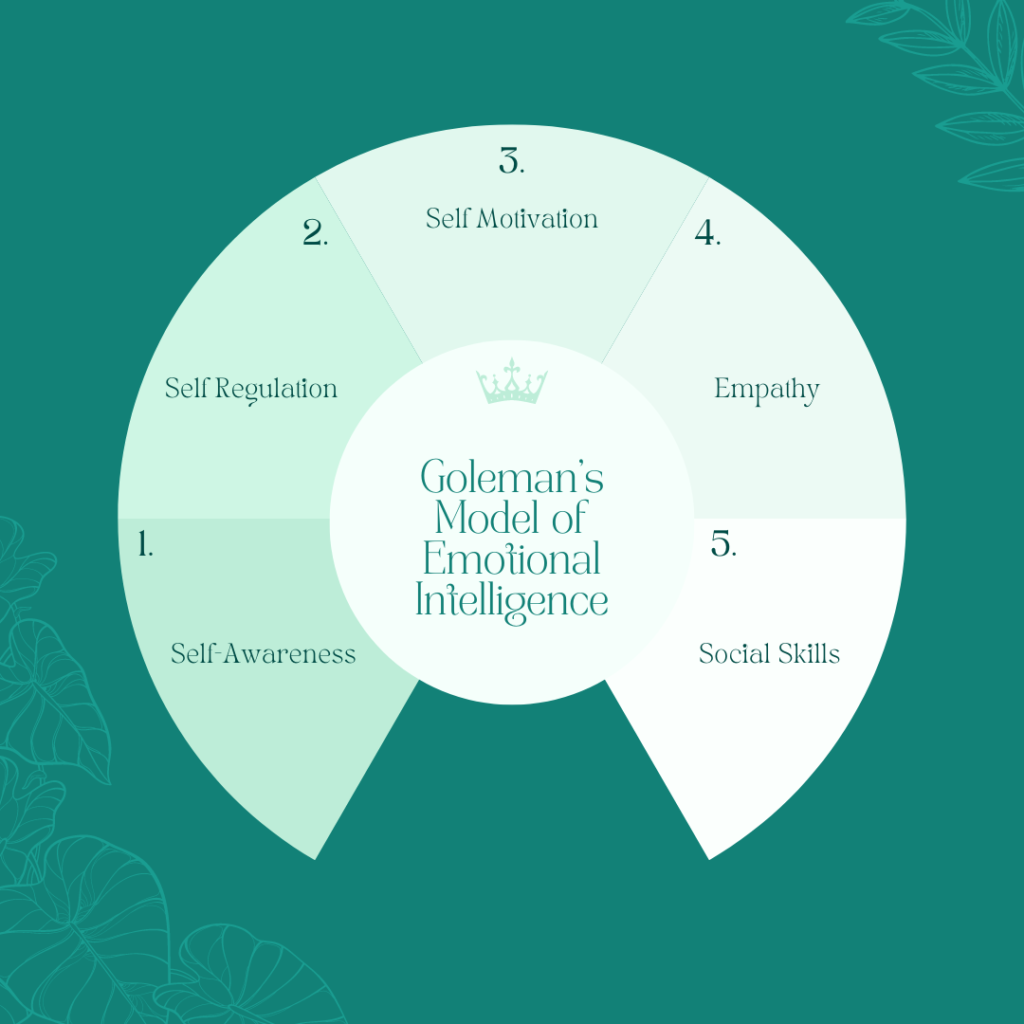Emotional intelligence has the potential to enrich lives and make people successful and fulfilled. Jack Mayer and Peter Salovey (1990) defined emotional intelligence as the capacity to control one’s emotions and use them to govern one’s behavior. A person’s emotional intelligence increases when they are well-balanced, sympathetic, and friendly rather than unbalanced, unfriendly, and unmotivated. “Our emotions have a mind of their own, one that can hold views quite independently of our rational mind.” Daniel Goleman (1995, p. 20)
Emotional intelligence: can professionals learn it?
The wonderful aspect is that emotional intelligence may be developed and enhanced at any time (Goleman, 2014). There are four phases to developing emotional intelligence, the first of which is gaining self-awareness. From there, one can work to improve their ability to manage their emotions as well as their motivation, empathy, and social skills.
The next stage is to try to assess where we stand with respect to each element of E.I. You may find many different types of E.I. exams on the internet, and if you’re looking for training in a formal setting, they’ll give you tools to evaluate your own emotional quotient.
Assessment provides us with a variety of possibilities from which to choose. We can choose the ideal type of training for us based on which aspect of emotional intelligence we need to improve. The last and most important step in developing emotional intelligence is applying what has been learned in the training.
Emotional Intelligence Training: A Toolkit
Emotional intelligence trainings are helpful because they teach people how to control their feelings and maintain their motivation. In other words, training in emotional intelligence consists of a collection of knowledge and skills that can be applied in real-world situations and teach people how to become emotionally literate and fluent.
According to Goleman’s Model of Emotional Intelligence, emotional intelligence training attempts to improve one or more of the following skills:

1. Self-Awareness:
Emotional self-awareness is the ability to notice emotions and understand how they affect others. Self-awareness is essential, especially for individuals in positions of leadership. A self-aware leader has better interactions and can provide constructive feedback when it is needed. They boost the performance of the organisation by hiring people who can do the job and delegating those jobs they cannot accomplish by being aware of their strengths and weaknesses.
2. Self-Regulation:
Self-regulation is the ability to exercise restraint by knowing what is necessary and would benefit everyone in a particular situation. In other words, self-regulation refers to how effectively we manage our emotions and respond to our experiences.
3. Motivation:
Self-motivation is the capacity to take pleasure in one’s work while simultaneously exerting oneself to the fullest extent in order to realise one’s ambitions. Employees who are self-motivated are motivated not by money or position but rather by the satisfaction they get from the work that they accomplish. It is essential to have a high level of self-motivation since it decreases the amount of time spent procrastinating, keeps one focused even in the midst of a setback, boosts one’s level of self-confidence, and ultimately leads to an increase in performance across the board for the entire team.
4. Empathy:
Empathy is the ability to recognize and comprehend the feelings of others. It is putting yourself in the shoes of the other person and attempting to comprehend why they are reacting in such a manner. Without empathy, you would only be concerned with your own emotions and getting everyone to agree with you. Employees who are empathetic try to see things from the other person’s point of view. Understanding how the other person feels allows you to be compassionate and willing to help, which leads to better social relationships.
5. Social skills:
Self-motivation is the capacity to take pleasure in one’s work while simultaneously exerting oneself to the fullest extent in order to realise one’s ambitions. Employees who are self-motivated are motivated not by money or position but rather by the satisfaction they get from the work that they accomplish. It is essential to have a high level of self-motivation since it decreases the amount of time spent procrastinating, keeps one focused even in the midst of a setback, boosts one’s level of self-confidence, and ultimately leads to an increase in performance across the board for the entire team.
E.I. Trainings: Objectives
Emotional Intelligence Trainings are generally aims to:
Enabling participants in communicating effectively with their coworkers, bosses, and subordinates.
Getting them to work as a team and build a strong sense of teamwork within the company forming new work relationships and reaching financial goals.
letting them know how far they’ve come and giving them the chance to improve their skills.
Creating a high-performance work environment where workers are self-motivated and know how to handle their feelings well.
By being mentally aware and mindful at work, we can help people learn how to be good leaders and managers.

E I Trainings: Learnings
Developing emotional intelligence entails cultivating a set of intrinsic abilities that assist us in improving our mental well-being on a daily basis. Here are five easy ways that EI instructors use to improve emotional intelligence. According to Daniel Goleman’s research, an emotionally intelligent person can develop emotional intelligence:
The ability to recognise one’s own emotions; the ability to relate to the feelings of others; and the ability to actively listen to others.
The ability to actively participate in interpersonal communication as well as recognize nonverbal signs of behaviour.
The ability to properly control emotions and communicate them in a socially acceptable manner.
The ability to accept and benefit from criticism.
The ability to forgive, forget, and move on sensibly.
Conclusion:
Emotional intelligence, like any other skill, requires practise. As a result, the organisation must foster a culture in which employees and management alike can practise and even perfect emotional intelligence. If someone don’t invest in their emotional well-being, their loyalty will wane, and they will just come to work to accomplish the bare minimum; just what is asked of them, and then go home, and thus the cycle of dissatisfied and unmotivated employees begins.





Leave a Reply